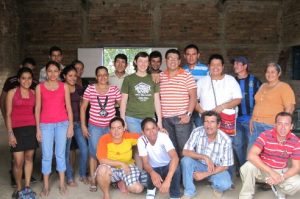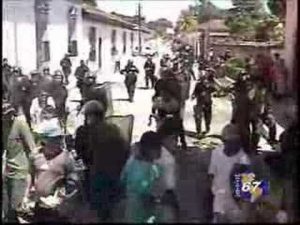Sister Cities
CA Social Organizations Reject Association Agreements with EU, April 17 2008
Members of broad social movement networks from Honduras, Guatemala, Nicaragua, Costa Rica, Panama and El Salvador have been meeting in San Salvador for the past 3 days to collectively strategize against the EU-Central American Association Agreement (ADA). According to Government negotiators, the ADA agreements would liberalize trade of goods and services, promote cooperation on such issues as fighting terrorism and trying international criminals, and further integrate the two regions.
Nevertheless the Central American social movement says that the negative impacts they predicted from the Central American Free Trade Agreement with the US will be amplified by the EU agreement, particularly in the areas of intellectual property rights and services. It is European companies, they say, which have the most aggressive interest in the privatization of water and energy, which this agreement would most benefit. Government negotiators from Central America and Europe paint the Association Agreement as one concerned with safeguarding human rights, democracy and sustainable development, but organizers call these claims disingenuous.
Yesterday campesino, environmental and union groups, representatives of rural organized communities, and others marched to the Radisson Hotel in San Salvador where the negotiations are were held by Government Officials behind closed doors. In a press conference outside the Radisson Hotel, leaders of the Central American social movement warned that the agreement will further enrich multinational corporations at the expense of Central American workers and farmers who are already negatively impacted by CAFTA.
According to Pedro Juan Hernandez of the October 12th Popular Resistance Movement, the Association Agreement is “being disguised as a political dialogue in strengthening democracy, but in the end it is nothing more than a free trade agreement. There are benefits (in the free trade agreements), but those benefits are for the European transnational companies and major economic interests in El Salvador…In these agreements we do not see anybody talking about the giant problems we are facing in Central America, (the negotiators) are not talking about the problems of poverty, immigration, and reactivating agricultural production.”
Salvadoran social organizations reject the Association Agreements, in part because the negotiations creating the agreement have not taken small and medium size businesses and farmers into account. Likewise, the Agreements are criticized because they do not recognize the fundamental asymmetries between the EU and Central American, nor do they address these differences. Amongst these concerns is what the social organizations describe as the vastly unequal distribution of wealth between the two regions, the protectionist measures that the EU uses for its agricultural sector, and actual amount of economic support the EU would offer Central America for development.
Furthermore, Salvadoran social organizations called on the EU and Central American governments to take the political, social and economic rights outlined in the negotiations seriously. They complained that the principle focus of the negotiations between EU and Central American Government negotiators has been the trade agreements, while agreements on human rights and political dialogue are being largely ignored.
Lorena Martinez, President of CRIPDES, called on the Government to reorient its approach to the negotiations: “Before talking about free trade, these negotiations must first consider human development, treatment of the environment, real agricultural development and the International Workers Organization (IWO) agreement about labor rights and unions. We can’t be talking about political dialogue when there are violations of human rights in the Central American Region.”
Martinez along with 13 others was captured while attempting to attend a forum on water privatization in Suchitoto in July of last year. The 14 defendants were charged with terrorism by the Salvadoran Government. In February the Salvadoran Court System threw out all charges against the Suchitoto 13, after the prosecution failed to present evidence of any wrongdoing.
Martinez was referring to the Salvadoran Supreme Court´s ruling last year that the IWO agreements are unconstitutional, after they had previously been ratified in El Salvador. The Supreme Court based its decision on articles in the Salvadoran Constitution which prohibit government employees from unionizing, while the IWO recognizes this right. Ratification of these IWO agreements is a condition for achieving preferential trading status with the European Union.
Another sticking point in the negotiations between European and Central American Governments has been the ratification of the Rome Statues which created the new International Criminal Court. While the EU has pushed for Central American countries to sign on to the Rome Statues as part of the ADA Agreements, several Central American countries including El Salvador have balked at ratifying the Statues, because they allege it would overturn national amnesty laws stemming from civil war in the region. These amnesty laws have blocked prosecuting anyone for war crimes during the civil wars in Guatemala, Nicaragua, and El Salvador. Recently the EU has backed off conditioning the ADA to signing of the Rome Statues.


